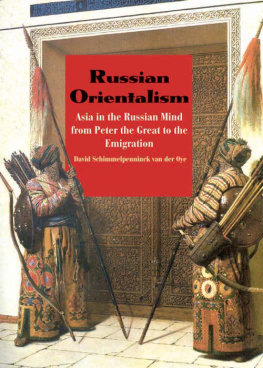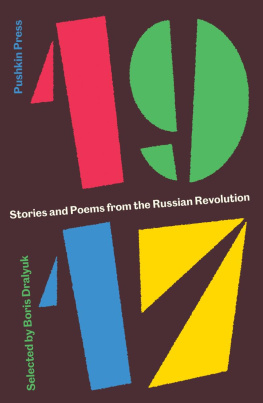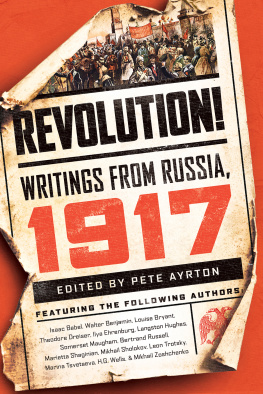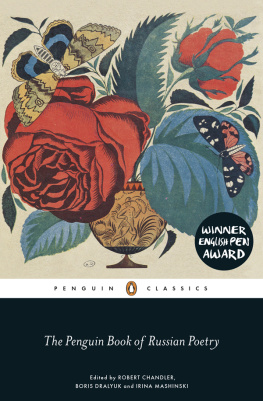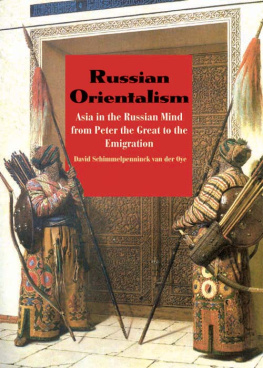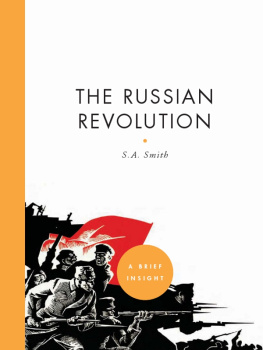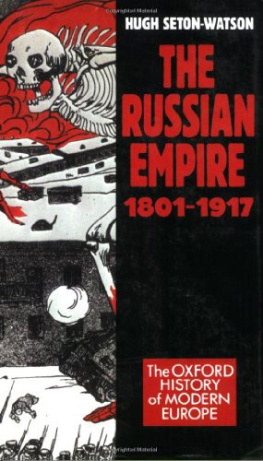PREFACE
This book resulted from conversations I had with Jonathan Brent, editorial director at Yale University Press, when I was a graduate student. I was trying to convince him of the merits of publishing my thesis about the origins of the Russo-Japanese War, which I was then writing. My suggestion fell on deaf, albeit polite, ears, and the book eventually appeared with another press. However, about two years later, Jonathan asked me if I would like to undertake a more general study about how Russians have thought about Asia. It was an offer I could not refuse.
As someone who grew up during the Cold War, I have long been intrigued by the nature of Russias identity. Living in Rotterdam in the early 1960s, I found it easy to imagine another assault from the East twenty years after the previous one. And, as my grandmother once joked, Asia begins just past Venlo (a small town on the German border). As a boy I therefore readily believed that Napoleon was right about what scratching a Russian will reveal about the latters true essence. I outgrew such stereotypes long ago. However, I remain fascinated by how they came about. More important, how do Russians themselves think about such matters? In a sense, this book is an exploration of these questions.
I am fortunate to have worked at a university that has encouraged my peculiar academic pursuits. In addition to being a most congenial environment for scholarship, Brock University also generously funded my research, including a munificent three-year Chancellors Chair of Research Excellence. I also benefited enormously from a Social Science and Humanities Research Council of Canada Standard Research Grant. Together, these awards enabled me to spend over half a year in Russia and Finland to carry out my research. A short-term grant from the Kennan Institute also funded work at the Library of Congress. I began writing this book in 2003 as a fellow at the National Humanities Center in Research Triangle Park, North Carolina, for which I am grateful as well.
A book like this could not have been undertaken without the hospitality many libraries extended to me. These included Sterling Memorial Library, the New York Public Library (its Slavic and Baltic Reading Room will be sorely missed), the Robarts Library, the Russian State Library (a.k.a. Leninka), the Russian National Library (Publichka), the library of the St. Petersburg Branch of the Oriental Institute, Kazan Universitys library, and, of course, the Slavonic Library in Helsinkithe most idyllic haven for studying Imperial Russias past. Brocks remarkable Inter- Library Loan Department was able to track down much of what I neglected to read when I was abroad.
Portions of this book appeared originally in Ab Imperio, Comparative Studies of South Asia, Africa and the Middle East, and The International Journal, as well as in the following edited volumes: William Leatherbarrow and Derrek Offord, eds., A History of Russian Thought; Michael David-Fox et al., eds., Orientalism and Empire in Russia; Svetlana Gorshenina and Sergej Abashin, eds., Le Turkestan russe colonial; and I. Gerasimov et al., eds., Novaia imperskaia istoriia postsovetskoro prostranstvo (A New Imperial History of the post-Soviet space). They are republished here with the kind permission of their editors.
Although it has been years since I was a student, my teachersin particular Paul Bushkovitchcontinue to be generous with their help. I have also pestered many other scholars and friends and remain thankful that they did not flee when I asked for their advice: Oleg Airapetov, Volodya Alexandrov, Sasha Andreev, Wladimir Berelowitch, Nikos Chrissidis, Micha David-Fox, Laura Engelstein, Lee Farrow, Tatiana Filippova, Liudmilla Gatagova, Bernice Glatzer Rosenthal, Charles Halperin, Valerie Hansen, Leonid Heller, Nathan Hunt, Maija Jansson, Edward Kasinec, Aleksandr Kavtaradze, Micha Kemper, Nathaniel Knight, Marlne Laruelle, John LeDonne, Dominic Lieven, Ralph Locke, Tania Lorkovic, Irina Lukka, Maureen Lux, Suzanne Marchand, Lorraine de Meaux, Bruce Menning, Irina Rybachenok, Mikhail Ryzhenkov, John Sainsbury, Elizabeth Sauer, Dany Savelli, Jennifer Siegel, Jonathan Spence, Jennifer Spock, John Steinberg, Mark Steinberg, Richard Stites, David Stone, Vera Tolz, Elizabeth Valkenier, Lynne Viola, Paul Werth, Cynthia Whittaker, and David Wolff.
I knew that it was time to complete this book when my daughter, Esme, then aged five, innocently asked me on the eve of my departure for a conference: Papa, will this help you to finish it? She and her brother, Sacha, remain a source of loving encouragement, as is my bride, Marie. It is to her I dedicate this book.
NOTE ON DATES AND TRANSLITERATIONS
Dates are according to the Julian calendar, which was used in Imperial Russia. In the nineteenth century, this calendar was twelve days behind the Gregorian calendar commonly employed in the West, whereas in the twentieth century it followed by thirteen days. For example, when Russians in St. Petersburg celebrated the New Year on January 1, 1895, it was already January 13, 1895, in Paris and London.
Transliterations from the Cyrillic alphabet adhere to the Library of Congress system, except for names and words widely known in English by other spellings. Thus, for example, I use Alexander III and Nicholas II, rather than Aleksandr III and Nikolai II. Where Russian surnames were adapted from German or other Western languages, I generally use the original.
Unless otherwise indicated, translations from European languages are my own.
INTRODUCTION: WHAT IS
RUSSIAN ORIENTALISM?
I am Asian too.
Joseph Stalin
The Age of Exploration some five hundred years ago was one of European geographys most important epochs. Beginning in the late fifteenth century, captains, merchants, and other adventurers burst free from their small continent and journeyed the globe, bringing back reports of entirely new worlds with fabled riches and wondrous inhabitants. The Portuguese navigator Bartolomeu Dias first rounded the Cape of Good Hope, while his compatriots Vasco da Gama and Ferdinand Magellan did much to chart the Pacific Ocean. Others, like Christopher Columbus and John Cabot, found enormous realms across the Atlantic.

